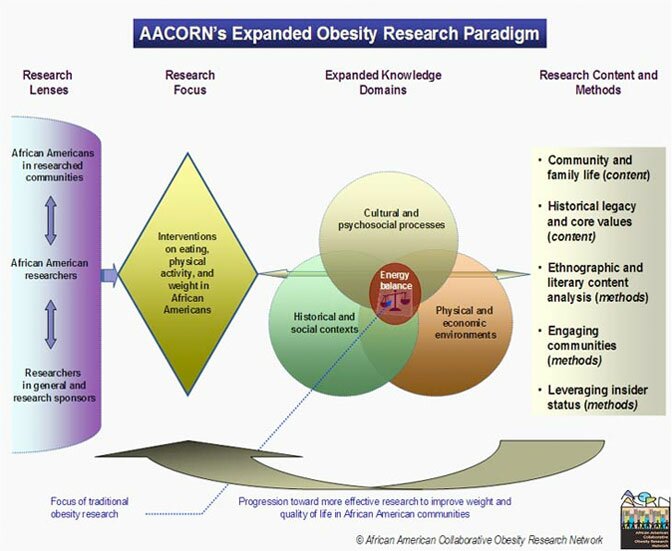| African American Collaborative Obesity Research Network Center for Clinical Epidemiology & Biostatistics University of Pennsylvania School of Medicine |
8th Floor Blockley Hall Philadelphia, PA 19104 |
Phone: Fax: |
Our Approach
In 2007, AACORN published an expanded obesity paradigm1 that calls for a broader interdisciplinary and contextualized approach to designing interventions on eating, physical activity, and weight, with particular reference to African Americans. The paradigm suggests that weight-control interventions must be informed by a broader knowledge base about life in African American communities and framed more holistically to consider other relevant social and health priorities and adaptations to adverse life circumstances.
AACORN's expanded obesity paradigm will evolve. However, the paradigm reflects the culmination and synthesis of the Network's thinking to date on what is needed to improve the quality of research to address weight issues in African American communities.

Kumanyika SK, Whitt-Glover MC, Gary TL, Prewitt TE, Odoms-Young AM, Banks-Wallace J, et al. Expanding the obesity
research paradigm to reach African American communities. Prev Chronic Dis 2007; 4(4). Click to view the article (PDF Format).
This paradigm expansion is based on the premise that the behaviors that determine weight status are embedded in the core social and cultural processes and environments of day-to-day life. Therefore, identifying effective solutions to obesity requires an ecological model that is inclusive of relevant contextual variables, which include variables influenced by race/ethnicity and social position.
Center: The traditional focus on caloric intake and output is depicted in the intersection of knowledge domains potentially informative for developing interventions on eating, physical activity and weight. This representation conveys the utility of factoring in knowledge of historical and social contexts, cultural and psychosocial processes, and the physical and economic environments that influence preferences, perceived, and actual choices related to food and activity and the relative ease or difficulty of exercising these choices. Such knowledge is fundamental to understanding the perspectives and day to day experiences that are the backdrop for weight control efforts. Accessing relevant knowledge from these expanded domains is enhanced by interactions with scholars in fields such as family sociology, literature, philosophy, transcultural psychology, economics, marketing, and urban planning.
Left: What is seen, asked and heard depends on who is looking and listening. Important eyes and ears for understanding weight issues include those of lay members of the communities of interest (e.g., African Americans in researched communities) and researchers in relevant fields whose expertise incorporates insights based on lived experiences and shared identity with the community of interest (e.g., African American nutrition, physical activity, public health, and other researchers), in addition to other researchers with relevant interests and expertise, and research sponsors.
Right: Content and methodological themes emanating from this inclusive, integrative paradigm applied to African Americans highlight: 1) the importance of considering family and community interactions related to food acquisition, food- and activity-related social interactions, the structure and organization of community processes, women's roles, and differences by generation, social position, and other demographic variables; 2) the potential influence of the collective historical legacy of slavery and its derivatives on core values such as trust and loyalty and on interactions with the health care system, media, and other social institutions; 3) The potential value of qualitative investigations that include direct observations, eliciting and analyzing narratives, and exploring the content of literary expressions to yield different or richer insights than obtained from more typical biomedical approaches; 4) The essential need to fully incorporate the views, expertise, and agency of community partners in the research process; 5) The potential benefits and challenges of encouraging African American researchers to leverage their insider status in ways that benefit the communities they study, the research endeavor, and their own academic careers.
Click here to see our Community-Centered View of Influences on Eating, Activity, and Body Weight.
© 2007 African American Collaborative Obesity Research Network. All Rights Reserved.